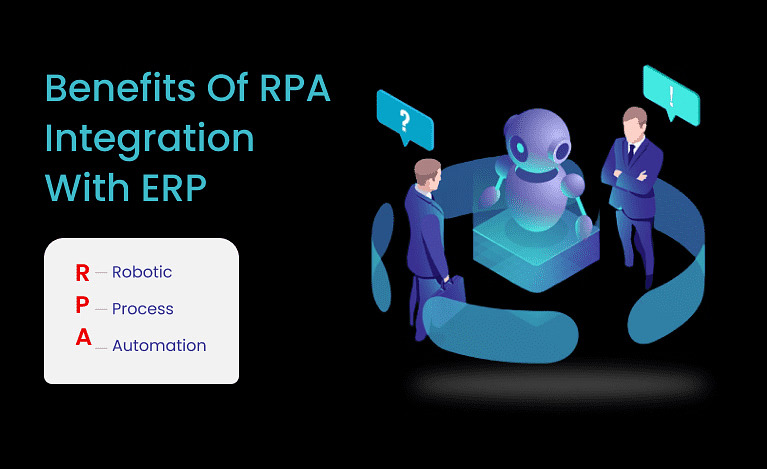Discover the Benefits of RPA Integration with ERP
Know how the integration of Robotic Process Automation (RPA) with Enterprise Resource Planning (ERP) systems can transform business operations. Explore the synergy between RPA and ERP, and understand the advantages of streamlining tasks and optimizing processes.
What is Robotic Process Automation (RPA)?
Robotic Process Automation (RPA) is like a digital workforce at your service. Imagine a team of tireless robots that can mimic human actions, interact with digital systems, and perform repetitive tasks with remarkable precision and speed. These digital workers, or “bots,” are trained to handle routine, rule-based processes, freeing up human employees to focus on more strategic and creative tasks. RPA is the linchpin of modern automation, and its integration with ERP systems can unlock a world of possibilities.
Role of RPA in ERP Applications
Enterprise Resource Planning (ERP) is the backbone of many businesses, encompassing a suite of integrated applications that manage and automate core functions such as finance, human resources, procurement, inventory, and more. ERP acts as a centralized hub, streamlining processes and facilitating data flow across various departments. When RPA joins hands with ERP, the synergy is undeniable.
The Benefits Of RPA Integration With ERP
Robotic process automation in the manufacturing sector is one of the most innovative approaches that firms can use to boost productivity, cut costs, and improve customer satisfaction in the era of Industrial Revolution 4.0. The integration of

Get started with RPA integration now and revolutionize your business processes! Contact Silent Infotech experts for a consultation.
The Difference Between RPA and ERP
RPA (Robotic Process Automation):
Task-Centric Automation:
- RPA involves the deployment of software robots to automate specific, well-defined tasks and processes.
- These tasks are typically rule-based, repetitive, and involve data entry, extraction, and validation.
- RPA excels at handling routine operations, reducing human intervention and potential errors.
Micro-Level Efficiency:
- RPA focuses on enhancing efficiency at the micro level, optimizing individual tasks for speed, accuracy, and consistency.
- By automating these tasks, RPA minimizes the time and effort required for repetitive activities, freeing up human resources.
Quick Wins and Specific Processes:
- RPA implementations are often chosen for rapid and targeted efficiency improvements in specific business processes.
- It shines in scenarios involving high-volume, repetitive tasks where human intervention is resource-intensive and time-consuming.
ERP (Enterprise Resource Planning):
End-to-End Integration:
- ERP acts as a central nervous system for an organization, enabling seamless communication and data flow among different departments.
- It breaks down information silos, promoting cross-functional collaboration and improving visibility into processes.
Macro-Level Optimization:
- Unlike RPA’s task-specific focus, ERP optimizes processes at the macro level, considering how various functions interconnect and influence overall operations.
- It identifies opportunities for process improvement and cost reduction by analyzing data across different departments.
Strategic Decision Support:
- ERP systems offer real-time data analytics and reporting capabilities, providing decision-makers with a comprehensive view of the organization’s performance.
- These insights help leaders make informed strategic decisions based on a holistic understanding of business operations.
Enhanced Productivity:
By automating manual and repetitive tasks, RPA ensures that these processes are executed consistently and swiftly. This leads to a significant boost in productivity, allowing employees to shift their focus from mundane tasks to value-added activities that require human ingenuity.
Cost Efficiency:
The combination of RPA and ERP results in cost savings over time. With RPA handling repetitive tasks, businesses can reduce labor costs and allocate resources more efficiently. Additionally, error reduction leads to decreased costs associated with error rectification.
Speed and Agility:
RPA operates at digital speeds, enabling swift execution of tasks round the clock. This agility is crucial in today’s competitive environment, allowing organizations to respond promptly to market changes and customer demands.
Data Accuracy and Compliance:
In industries where regulatory compliance is a must, RPA can play a pivotal role in maintaining accurate records and ensuring adherence to regulations. Automated processes leave a reliable audit trail, making compliance audits smoother and more transparent for enterprise business.
Accuracy and Quality:
Human errors are an unfortunate reality in manual processes. RPA brings a digital touch to accuracy, reducing the likelihood of errors in data entry, reconciliation, and validation. This ensures data integrity and high-quality outputs while using automation.
Scalability:
As business operations grow, RPA can easily adapt to increased workloads. Unlike traditional manpower, adding more bots to the workforce is a seamless process, ensuring scalability without compromising efficiency.
Get FREE Consultation
Benefits of RPA Integration with ERP
Invoice Processing:
RPA can scan, extract, and validate data from invoices, feeding the information directly into ERP systems. This not only accelerates the invoicing process but also reduces the chances of errors that might occur during manual data entry.
Data Migration and Integration:
When organizations migrate to a new ERP system or need to integrate data from multiple sources, RPA can facilitate smooth data migration, transforming and mapping data without the need for extensive manual intervention.
Inventory Management:
RPA can monitor inventory levels, generate purchase orders, and update stock counts in real-time. This minimizes stockouts and overstock situations while maintaining optimal inventory levels.
Order Management:
RPA can automate order entry, tracking, and fulfillment, ensuring seamless communication between ERP modules. This streamlines the entire order-to-cash process and enhances customer satisfaction.
Employee Onboarding:
RPA can handle various aspects of employee onboarding, including document verification, data entry, and provisioning access to different systems. This speeds up the onboarding process and ensures accuracy in personnel records.
Vendor & Customer Communication:
RPA can automate communication with vendors and customers by sending notifications, reminders, and updates related to orders, invoices, and payments through the ERP system.
Final Thoughts
The marriage of
About The Brand
At Silent Infotech, we specialize in crafting tailored RPA and ERP integration solutions that empower your business. Our expertise lies in harmonizing cutting-edge automation with comprehensive process management, ensuring a smooth transition towards enhanced productivity and streamlined operations. Experience the future of business efficiency with Silent Infotech.

Jignesh V
Jignesh Vaghasiya, COO of Silent Infotech, is a technology visionary with a passion for innovation. He has deep technical expertise and a commitment to client success to drive the company's growth. His relentless pursuit of new technologies, combined with his process-focused approach, has led to innovation and technology implementations that boost business outcomes. Jignesh's ability to connect with people makes him the ideal partner for onboarding new clients and fostering strong business relationships.
Schedule Consultation with Jignesh Schedule Now